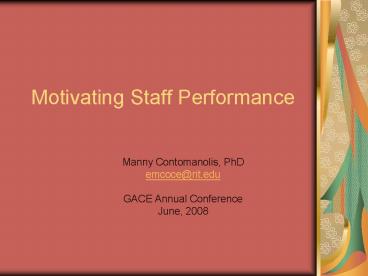Motivating Staff Performance
1 / 20
Title:
Motivating Staff Performance
Description:
Inspirational slogans, posters, and coffee cups. A one-size-fits-all strategy. 5 ... Motivation is the process of mobilizing and sustaining individual behaviors in ... –
Number of Views:59
Avg rating:3.0/5.0
Title: Motivating Staff Performance
1
Motivating Staff Performance
- Manny Contomanolis, PhD
- emcoce_at_rit.edu
- GACE Annual Conference
- June, 2008
2
Motivating Performance
- How do we define motivation?
- What key principles do we need to understand in
motivating others? - What specific strategies help motivate others?
3
Case Study Exercise
4
Motivation is NOT
- RA, RA, SHISH, BOOM, BA!!!!!!!!
- Inspirational slogans, posters, and coffee cups
- A one-size-fits-all strategy
5
Defining Motivation
- Motivation is the process of mobilizing and
sustaining individual behaviors in support of
organizational goals.
6
Theoretical Principles
- I do it because it meets my needs
- Mazlow hierarchy of needs - physiological,
safety, social and love, esteem,
self-actualization - I do it because I have a particular need
- McClelland achievement, power, affiliation are
the primary motivating needs
7
Theoretical Principles continued
- I do it its my job
- Herzberg there are two sets of job factors one
set motivates, the other is either neutral or
causes dissatisfaction - I do it because its the goal
- Locke and Latham behavior is driven by goals and
values. Goals should be specific, hard but
realistic, set and accepted by the individual,
linked to performance and rewards,
learning-oriented.
8
Theoretical Principlescontinued
- I do it because its in my best interest to do
so - Skinner behavior is determined by its
consequences positive reinforcement, avoidance,
extinction, punishment - I do it to get what I value
- Expectancy theory deliberate choice to engage in
activities in order to achieve worthwhile and
desirable outcomes
9
Theoretical Principlescontinued
- I do what everybody else does
- Social learning theory people learn motivated
behaviors by observing and imitating others
people seek approval - I do it because its interesting
- Self-determination or intrinsic motivation
theory people are motivated to do interesting
work especially when they have a choice in
initiating and regulating their actions
10
So What DO People Want?
- A sense of purpose
- A sense of pride and respect
- Recognition and appreciation
- Support and encouragement
- Camaraderie
11
What does this mean for you?
- Motivation is an individual phenomenon
- You need to be flexible and situational in
motivating others - Equal does NOT mean Fair
- Dont treat people the way YOU want to be treated
treat them the way THEY want to be treated. - Work to create a motivating environment
12
Your role in developing a motivating environment
- Create a compelling vision - focus on
possibilities not problems - Help others feel fully engaged dont just ask
for feedback use it! - Foster a learning environment
- Be goal-oriented but flexible about how to get
there
13
Your role in developing a motivating environment
- Support people when they make a mistake
- Demonstrate integrity between your words and
actions
14
Strategies for encouraging motivation
- Recognition
- Mentor, guide, and coach
- Praise
- Reward
- Recognition programs staff input increases
effectiveness. Evaluate carefully programs
often have a very limited shelf life
15
Strategies for encouraging motivation
- Job enrichment/Job Sculpting
- New learning
- Control over scheduling
- Unique experiences
- Client relationships
- Control over resources
- Direct communication
- Personal accountability
- Direct feedback
16
Strategies for encouraging motivation
- Self-managed projects or work teams
- Formally recognized group responsible for an
entire work process and outcomes - Members empowered to share leadership and
management functions - Members set their own goals and inspect their
work - Members set their own schedules and review group
performance
17
Strategies for encouraging motivation
- Self-managed work teams (cont)
- Members prepare their own budgets and coordinate
work with others - Members responsible for obtaining any additional
training they might need - Members find their own replacements
- Members assume responsibility for the quality of
their efforts
18
Strategies for encouraging motivation
- Financial Incentives
- Compensation
- Bonuses
- In the higher education world often the most
difficult to implement.
19
Motivation Efforts Summary
- Determine what levels and kinds of performance
are needed to achieve your organizational goals - Train, encourage, and support people
- Understand and respond to individual differences
and needs - Use positive reinforcement
20
Brainstorming ExerciseWhats Worked for You?































